Marketing for Managers: Customer Value Anticipation Report Analysis
VerifiedAdded on 2022/07/20
|6
|1312
|44
Report
AI Summary
This report analyzes the Emerald Insight Journal article by Anning-Dorson, Christian, and Tackie (2021) titled "Customer loyalty and value anticipation: does regarded competition matter?" The study investigates the moderating effects of rivalry on the connection among customer value anticipation (CVA), satisfaction, and retention, as perceived by customers within the context of Ghana's banking industry. The report examines the conceptual background, including the impact of regulatory reforms and increased competition in the banking sector. It explores the hypotheses related to the relationships between CVA, satisfaction, customer loyalty (both attitudinal and behavioral), and the moderating role of competition. The study's findings indicate that customers value the ability of service providers to anticipate their needs, leading to increased satisfaction and loyalty. While competition was found to have a limited impact, the research highlights the importance of CVA in achieving customer loyalty. The report concludes with implications for service organizations, emphasizing the need to forecast customer needs to thrive in competitive markets. The report also discusses the limitations of the study.
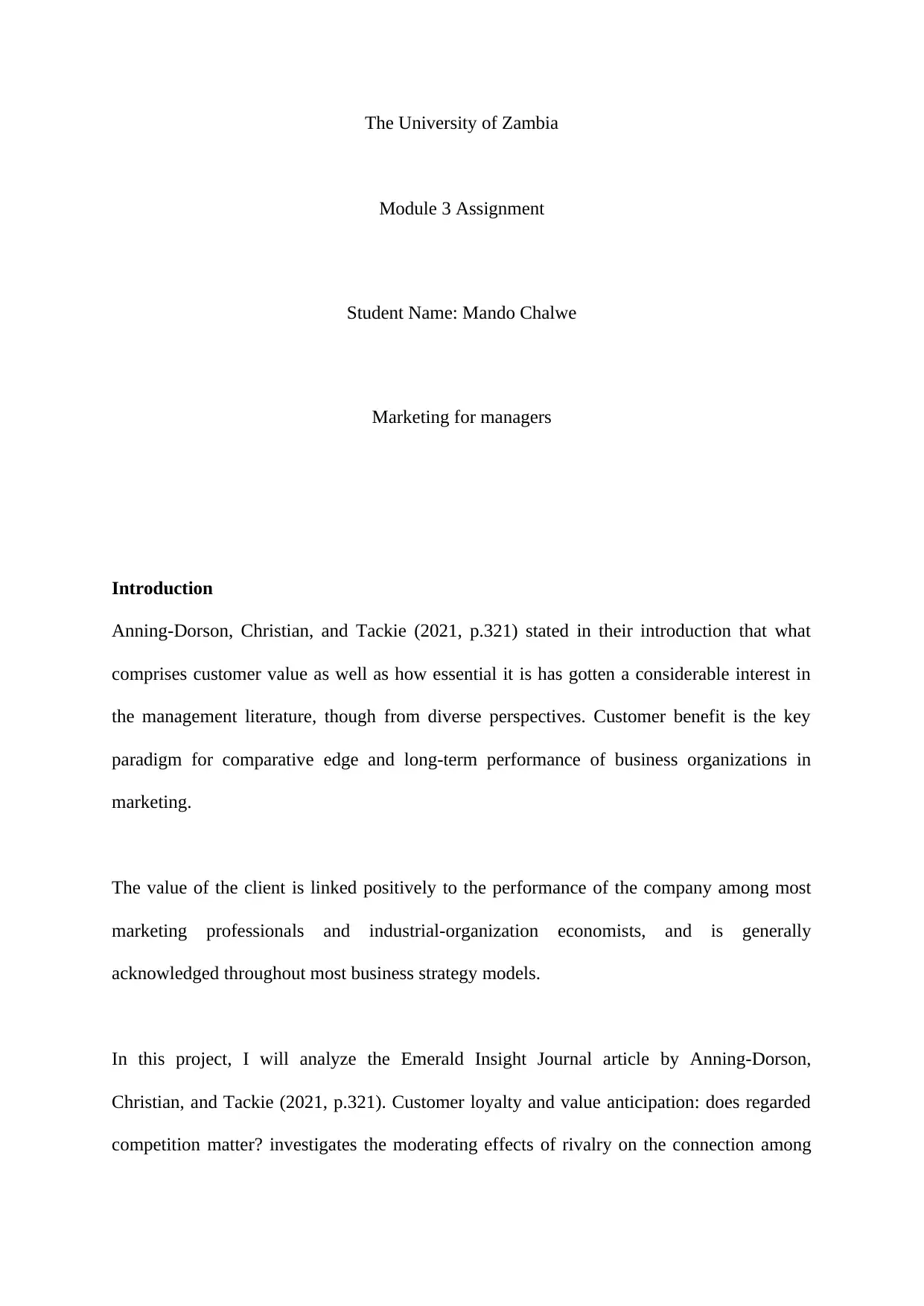
The University of Zambia
Module 3 Assignment
Student Name: Mando Chalwe
Marketing for managers
Introduction
Anning-Dorson, Christian, and Tackie (2021, p.321) stated in their introduction that what
comprises customer value as well as how essential it is has gotten a considerable interest in
the management literature, though from diverse perspectives. Customer benefit is the key
paradigm for comparative edge and long-term performance of business organizations in
marketing.
The value of the client is linked positively to the performance of the company among most
marketing professionals and industrial-organization economists, and is generally
acknowledged throughout most business strategy models.
In this project, I will analyze the Emerald Insight Journal article by Anning-Dorson,
Christian, and Tackie (2021, p.321). Customer loyalty and value anticipation: does regarded
competition matter? investigates the moderating effects of rivalry on the connection among
Module 3 Assignment
Student Name: Mando Chalwe
Marketing for managers
Introduction
Anning-Dorson, Christian, and Tackie (2021, p.321) stated in their introduction that what
comprises customer value as well as how essential it is has gotten a considerable interest in
the management literature, though from diverse perspectives. Customer benefit is the key
paradigm for comparative edge and long-term performance of business organizations in
marketing.
The value of the client is linked positively to the performance of the company among most
marketing professionals and industrial-organization economists, and is generally
acknowledged throughout most business strategy models.
In this project, I will analyze the Emerald Insight Journal article by Anning-Dorson,
Christian, and Tackie (2021, p.321). Customer loyalty and value anticipation: does regarded
competition matter? investigates the moderating effects of rivalry on the connection among
Paraphrase This Document
Need a fresh take? Get an instant paraphrase of this document with our AI Paraphraser
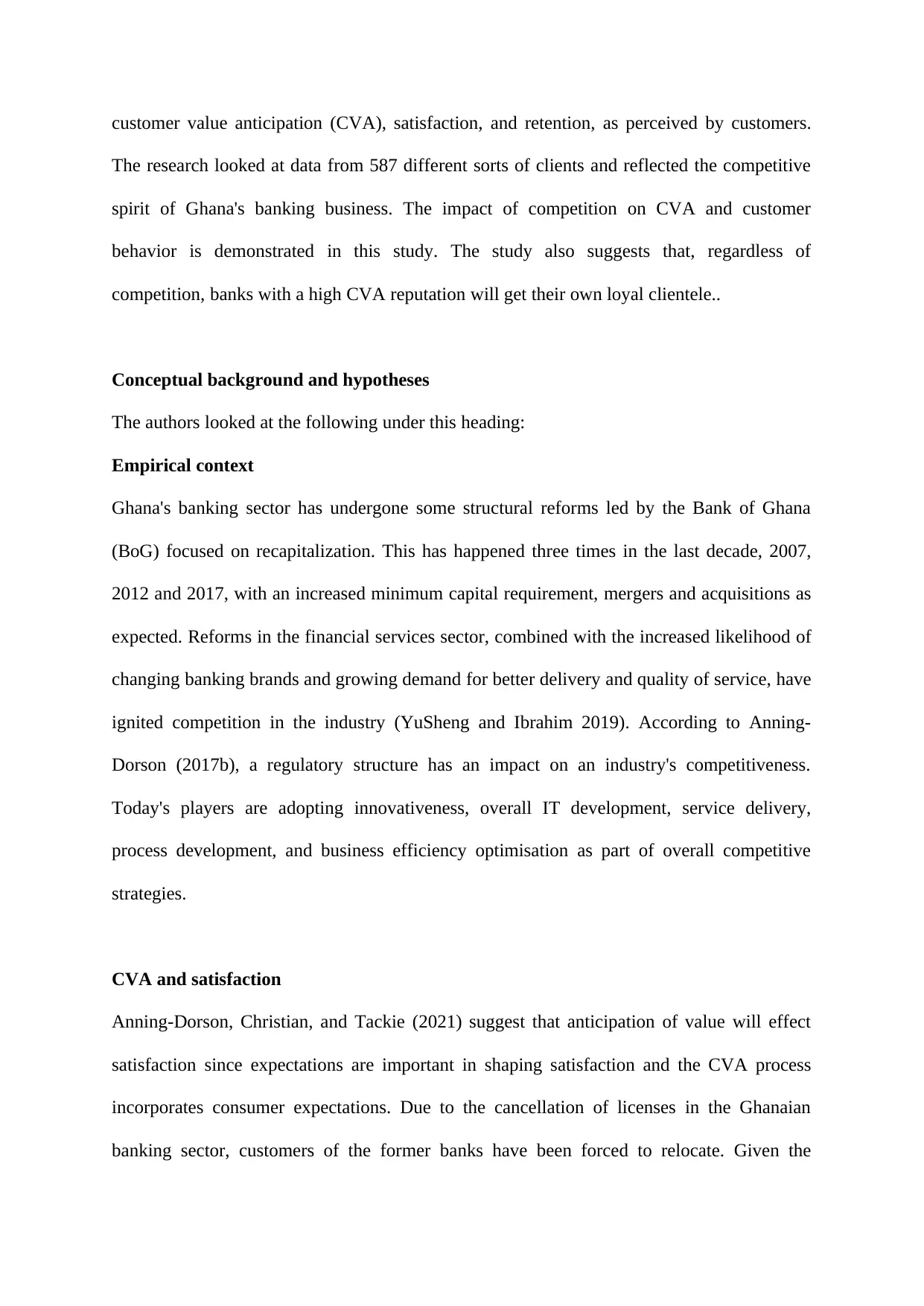
customer value anticipation (CVA), satisfaction, and retention, as perceived by customers.
The research looked at data from 587 different sorts of clients and reflected the competitive
spirit of Ghana's banking business. The impact of competition on CVA and customer
behavior is demonstrated in this study. The study also suggests that, regardless of
competition, banks with a high CVA reputation will get their own loyal clientele..
Conceptual background and hypotheses
The authors looked at the following under this heading:
Empirical context
Ghana's banking sector has undergone some structural reforms led by the Bank of Ghana
(BoG) focused on recapitalization. This has happened three times in the last decade, 2007,
2012 and 2017, with an increased minimum capital requirement, mergers and acquisitions as
expected. Reforms in the financial services sector, combined with the increased likelihood of
changing banking brands and growing demand for better delivery and quality of service, have
ignited competition in the industry (YuSheng and Ibrahim 2019). According to Anning-
Dorson (2017b), a regulatory structure has an impact on an industry's competitiveness.
Today's players are adopting innovativeness, overall IT development, service delivery,
process development, and business efficiency optimisation as part of overall competitive
strategies.
CVA and satisfaction
Anning-Dorson, Christian, and Tackie (2021) suggest that anticipation of value will effect
satisfaction since expectations are important in shaping satisfaction and the CVA process
incorporates consumer expectations. Due to the cancellation of licenses in the Ghanaian
banking sector, customers of the former banks have been forced to relocate. Given the
The research looked at data from 587 different sorts of clients and reflected the competitive
spirit of Ghana's banking business. The impact of competition on CVA and customer
behavior is demonstrated in this study. The study also suggests that, regardless of
competition, banks with a high CVA reputation will get their own loyal clientele..
Conceptual background and hypotheses
The authors looked at the following under this heading:
Empirical context
Ghana's banking sector has undergone some structural reforms led by the Bank of Ghana
(BoG) focused on recapitalization. This has happened three times in the last decade, 2007,
2012 and 2017, with an increased minimum capital requirement, mergers and acquisitions as
expected. Reforms in the financial services sector, combined with the increased likelihood of
changing banking brands and growing demand for better delivery and quality of service, have
ignited competition in the industry (YuSheng and Ibrahim 2019). According to Anning-
Dorson (2017b), a regulatory structure has an impact on an industry's competitiveness.
Today's players are adopting innovativeness, overall IT development, service delivery,
process development, and business efficiency optimisation as part of overall competitive
strategies.
CVA and satisfaction
Anning-Dorson, Christian, and Tackie (2021) suggest that anticipation of value will effect
satisfaction since expectations are important in shaping satisfaction and the CVA process
incorporates consumer expectations. Due to the cancellation of licenses in the Ghanaian
banking sector, customers of the former banks have been forced to relocate. Given the
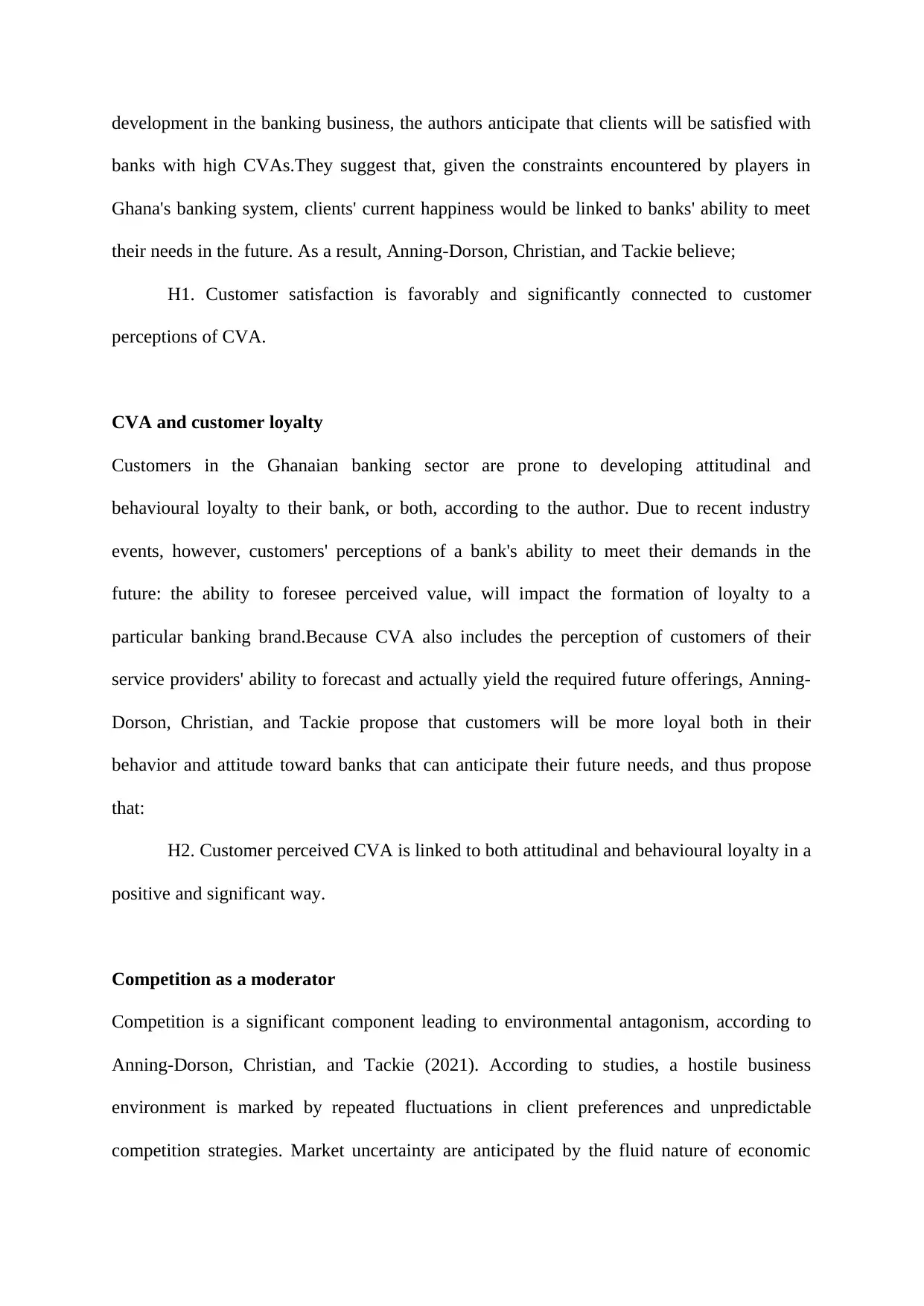
development in the banking business, the authors anticipate that clients will be satisfied with
banks with high CVAs.They suggest that, given the constraints encountered by players in
Ghana's banking system, clients' current happiness would be linked to banks' ability to meet
their needs in the future. As a result, Anning-Dorson, Christian, and Tackie believe;
H1. Customer satisfaction is favorably and significantly connected to customer
perceptions of CVA.
CVA and customer loyalty
Customers in the Ghanaian banking sector are prone to developing attitudinal and
behavioural loyalty to their bank, or both, according to the author. Due to recent industry
events, however, customers' perceptions of a bank's ability to meet their demands in the
future: the ability to foresee perceived value, will impact the formation of loyalty to a
particular banking brand.Because CVA also includes the perception of customers of their
service providers' ability to forecast and actually yield the required future offerings, Anning-
Dorson, Christian, and Tackie propose that customers will be more loyal both in their
behavior and attitude toward banks that can anticipate their future needs, and thus propose
that:
H2. Customer perceived CVA is linked to both attitudinal and behavioural loyalty in a
positive and significant way.
Competition as a moderator
Competition is a significant component leading to environmental antagonism, according to
Anning-Dorson, Christian, and Tackie (2021). According to studies, a hostile business
environment is marked by repeated fluctuations in client preferences and unpredictable
competition strategies. Market uncertainty are anticipated by the fluid nature of economic
banks with high CVAs.They suggest that, given the constraints encountered by players in
Ghana's banking system, clients' current happiness would be linked to banks' ability to meet
their needs in the future. As a result, Anning-Dorson, Christian, and Tackie believe;
H1. Customer satisfaction is favorably and significantly connected to customer
perceptions of CVA.
CVA and customer loyalty
Customers in the Ghanaian banking sector are prone to developing attitudinal and
behavioural loyalty to their bank, or both, according to the author. Due to recent industry
events, however, customers' perceptions of a bank's ability to meet their demands in the
future: the ability to foresee perceived value, will impact the formation of loyalty to a
particular banking brand.Because CVA also includes the perception of customers of their
service providers' ability to forecast and actually yield the required future offerings, Anning-
Dorson, Christian, and Tackie propose that customers will be more loyal both in their
behavior and attitude toward banks that can anticipate their future needs, and thus propose
that:
H2. Customer perceived CVA is linked to both attitudinal and behavioural loyalty in a
positive and significant way.
Competition as a moderator
Competition is a significant component leading to environmental antagonism, according to
Anning-Dorson, Christian, and Tackie (2021). According to studies, a hostile business
environment is marked by repeated fluctuations in client preferences and unpredictable
competition strategies. Market uncertainty are anticipated by the fluid nature of economic
⊘ This is a preview!⊘
Do you want full access?
Subscribe today to unlock all pages.

Trusted by 1+ million students worldwide
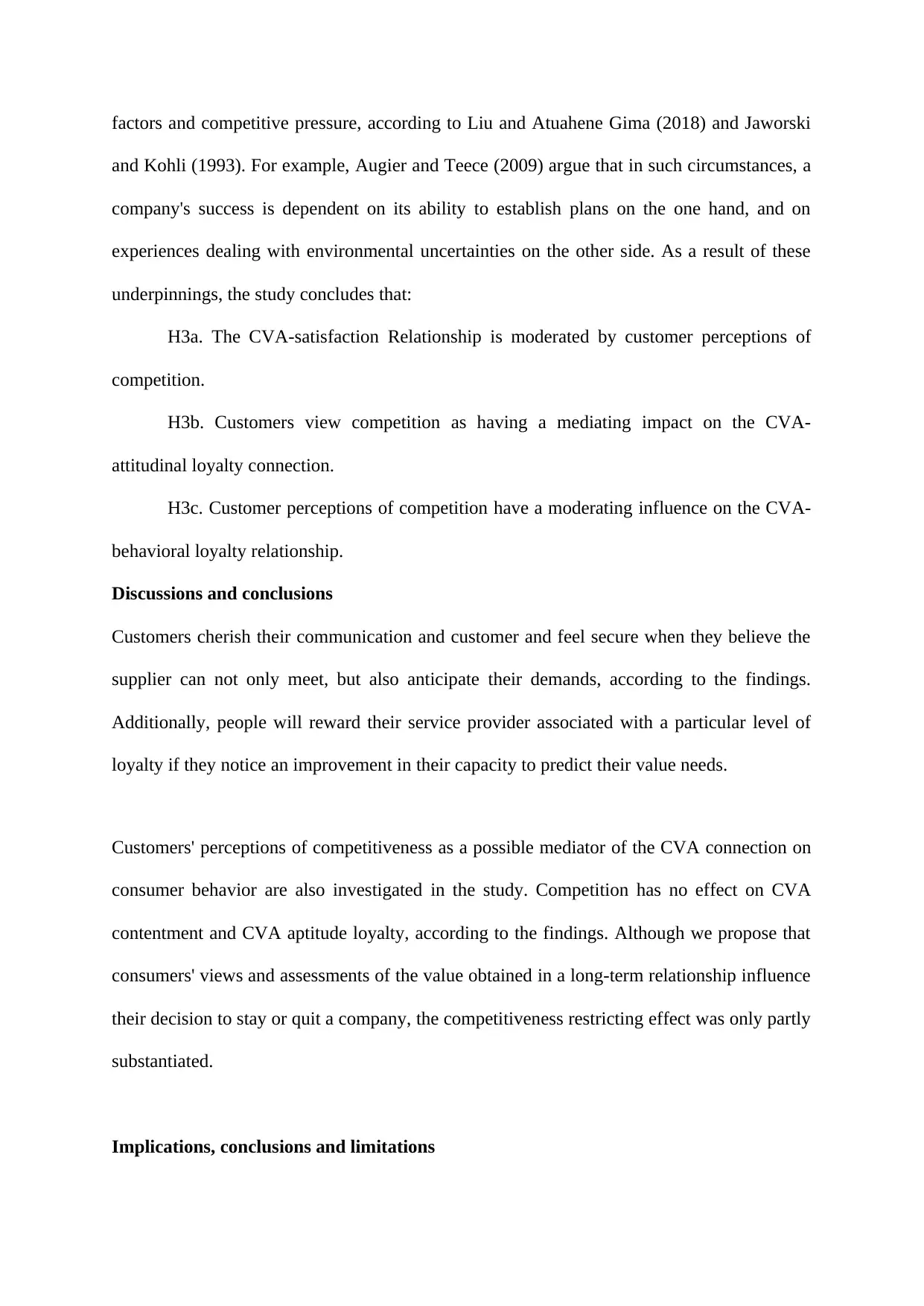
factors and competitive pressure, according to Liu and Atuahene Gima (2018) and Jaworski
and Kohli (1993). For example, Augier and Teece (2009) argue that in such circumstances, a
company's success is dependent on its ability to establish plans on the one hand, and on
experiences dealing with environmental uncertainties on the other side. As a result of these
underpinnings, the study concludes that:
H3a. The CVA-satisfaction Relationship is moderated by customer perceptions of
competition.
H3b. Customers view competition as having a mediating impact on the CVA-
attitudinal loyalty connection.
H3c. Customer perceptions of competition have a moderating influence on the CVA-
behavioral loyalty relationship.
Discussions and conclusions
Customers cherish their communication and customer and feel secure when they believe the
supplier can not only meet, but also anticipate their demands, according to the findings.
Additionally, people will reward their service provider associated with a particular level of
loyalty if they notice an improvement in their capacity to predict their value needs.
Customers' perceptions of competitiveness as a possible mediator of the CVA connection on
consumer behavior are also investigated in the study. Competition has no effect on CVA
contentment and CVA aptitude loyalty, according to the findings. Although we propose that
consumers' views and assessments of the value obtained in a long-term relationship influence
their decision to stay or quit a company, the competitiveness restricting effect was only partly
substantiated.
Implications, conclusions and limitations
and Kohli (1993). For example, Augier and Teece (2009) argue that in such circumstances, a
company's success is dependent on its ability to establish plans on the one hand, and on
experiences dealing with environmental uncertainties on the other side. As a result of these
underpinnings, the study concludes that:
H3a. The CVA-satisfaction Relationship is moderated by customer perceptions of
competition.
H3b. Customers view competition as having a mediating impact on the CVA-
attitudinal loyalty connection.
H3c. Customer perceptions of competition have a moderating influence on the CVA-
behavioral loyalty relationship.
Discussions and conclusions
Customers cherish their communication and customer and feel secure when they believe the
supplier can not only meet, but also anticipate their demands, according to the findings.
Additionally, people will reward their service provider associated with a particular level of
loyalty if they notice an improvement in their capacity to predict their value needs.
Customers' perceptions of competitiveness as a possible mediator of the CVA connection on
consumer behavior are also investigated in the study. Competition has no effect on CVA
contentment and CVA aptitude loyalty, according to the findings. Although we propose that
consumers' views and assessments of the value obtained in a long-term relationship influence
their decision to stay or quit a company, the competitiveness restricting effect was only partly
substantiated.
Implications, conclusions and limitations
Paraphrase This Document
Need a fresh take? Get an instant paraphrase of this document with our AI Paraphraser
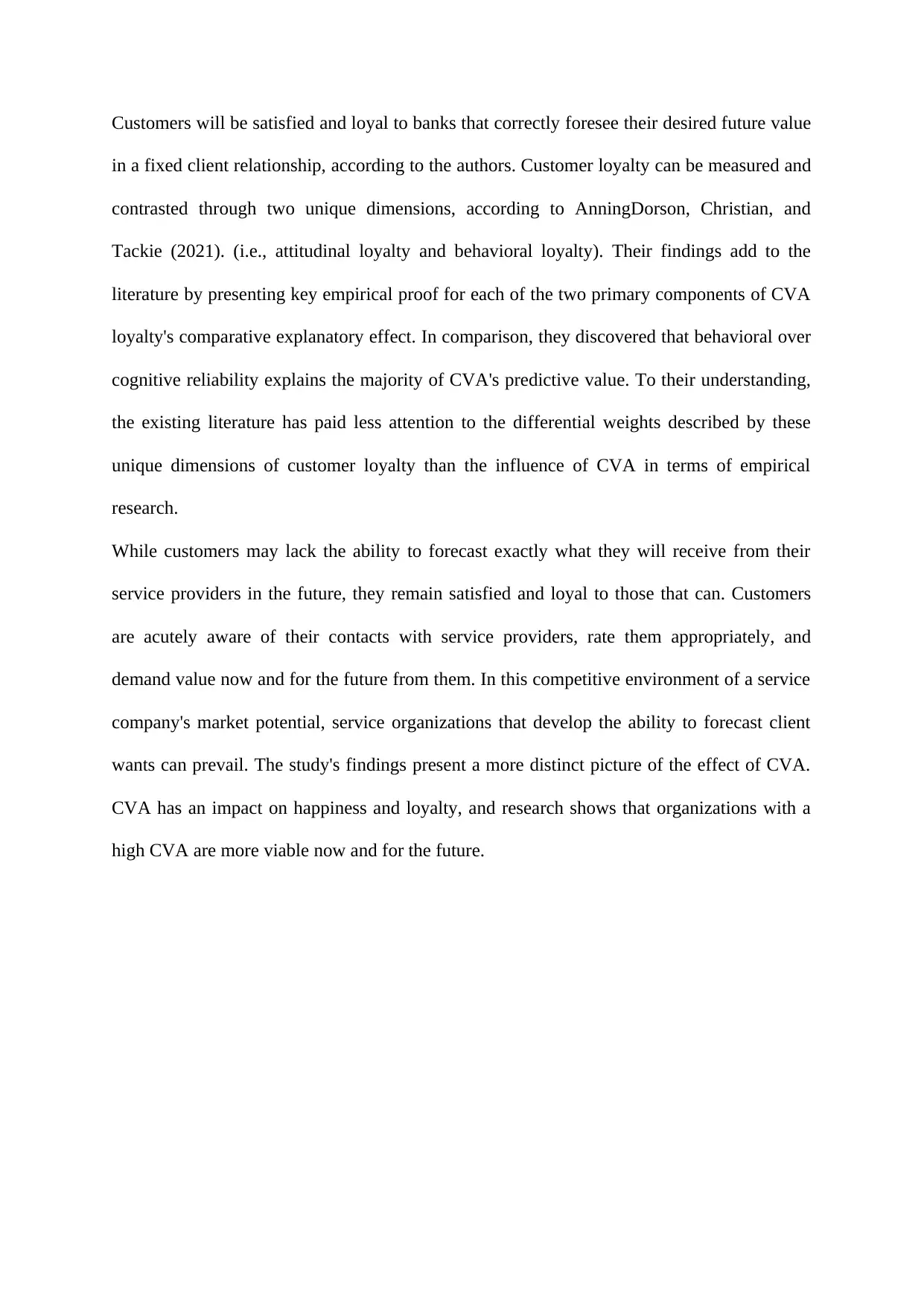
Customers will be satisfied and loyal to banks that correctly foresee their desired future value
in a fixed client relationship, according to the authors. Customer loyalty can be measured and
contrasted through two unique dimensions, according to AnningDorson, Christian, and
Tackie (2021). (i.e., attitudinal loyalty and behavioral loyalty). Their findings add to the
literature by presenting key empirical proof for each of the two primary components of CVA
loyalty's comparative explanatory effect. In comparison, they discovered that behavioral over
cognitive reliability explains the majority of CVA's predictive value. To their understanding,
the existing literature has paid less attention to the differential weights described by these
unique dimensions of customer loyalty than the influence of CVA in terms of empirical
research.
While customers may lack the ability to forecast exactly what they will receive from their
service providers in the future, they remain satisfied and loyal to those that can. Customers
are acutely aware of their contacts with service providers, rate them appropriately, and
demand value now and for the future from them. In this competitive environment of a service
company's market potential, service organizations that develop the ability to forecast client
wants can prevail. The study's findings present a more distinct picture of the effect of CVA.
CVA has an impact on happiness and loyalty, and research shows that organizations with a
high CVA are more viable now and for the future.
in a fixed client relationship, according to the authors. Customer loyalty can be measured and
contrasted through two unique dimensions, according to AnningDorson, Christian, and
Tackie (2021). (i.e., attitudinal loyalty and behavioral loyalty). Their findings add to the
literature by presenting key empirical proof for each of the two primary components of CVA
loyalty's comparative explanatory effect. In comparison, they discovered that behavioral over
cognitive reliability explains the majority of CVA's predictive value. To their understanding,
the existing literature has paid less attention to the differential weights described by these
unique dimensions of customer loyalty than the influence of CVA in terms of empirical
research.
While customers may lack the ability to forecast exactly what they will receive from their
service providers in the future, they remain satisfied and loyal to those that can. Customers
are acutely aware of their contacts with service providers, rate them appropriately, and
demand value now and for the future from them. In this competitive environment of a service
company's market potential, service organizations that develop the ability to forecast client
wants can prevail. The study's findings present a more distinct picture of the effect of CVA.
CVA has an impact on happiness and loyalty, and research shows that organizations with a
high CVA are more viable now and for the future.
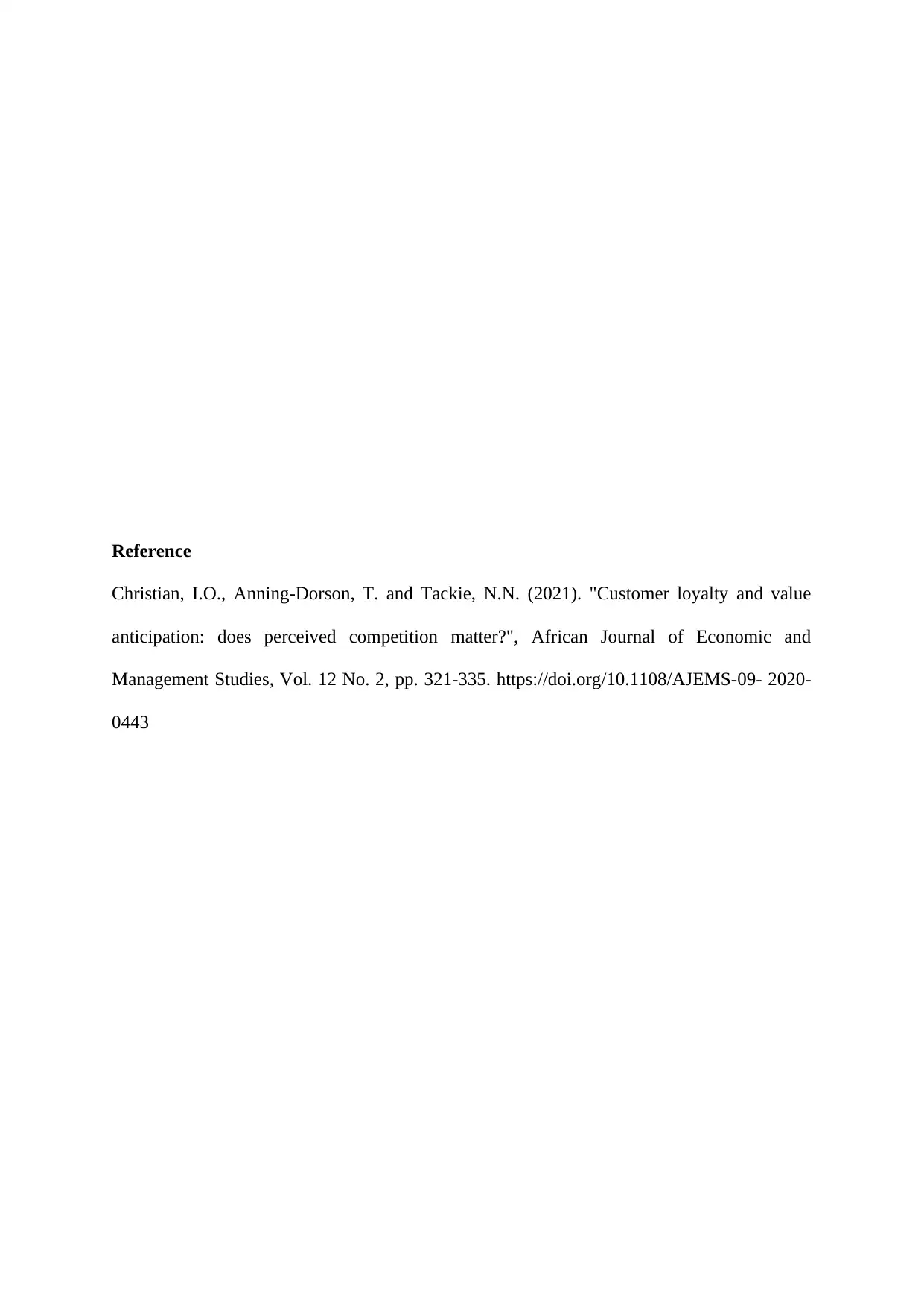
Reference
Christian, I.O., Anning-Dorson, T. and Tackie, N.N. (2021). "Customer loyalty and value
anticipation: does perceived competition matter?", African Journal of Economic and
Management Studies, Vol. 12 No. 2, pp. 321-335. https://doi.org/10.1108/AJEMS-09- 2020-
0443
Christian, I.O., Anning-Dorson, T. and Tackie, N.N. (2021). "Customer loyalty and value
anticipation: does perceived competition matter?", African Journal of Economic and
Management Studies, Vol. 12 No. 2, pp. 321-335. https://doi.org/10.1108/AJEMS-09- 2020-
0443
⊘ This is a preview!⊘
Do you want full access?
Subscribe today to unlock all pages.

Trusted by 1+ million students worldwide
1 out of 6
Your All-in-One AI-Powered Toolkit for Academic Success.
+13062052269
info@desklib.com
Available 24*7 on WhatsApp / Email
![[object Object]](/_next/static/media/star-bottom.7253800d.svg)
Unlock your academic potential
Copyright © 2020–2026 A2Z Services. All Rights Reserved. Developed and managed by ZUCOL.